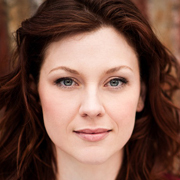
Esther Stephens
Esther Stephens is often asked whether she would be an actor or a singer, if she had to choose. It is not a question she is keen to indulge.
NZ Herald writer Alan Perrott has called Stephens' childhood "a Howick version of the Von Trapps". Music runs in the family, including a father who wrote musicals. Stephens knew early on that she wanted to be a performer. "Dressing up, inventing characters and playing up to my family: I loved it all, especially those musicals," she told Perrott. "But I didn't have the physical discipline to be a dancer, so it was always going to be a combination of singing and acting."
At age 12 Stephens formed a band — the first of many — inspired by the Spice Girls and Celine Dion. Lauryn Hill's first solo album sent her in a new direction. "Dad even learned the songs on guitar so he could sing them with me."
After leaving school, it was a toss-up between studying acting or vocals at jazz school. Deciding to strengthen the area she felt weakest in, she took a three year course in performing and screen arts at Unitec. But screen acting was not on her agenda. "Ever since school I'd assumed I was too big for television, all waving arms and that ... I stuck with theatre."
Director Michael Hurst first cast Stephens in a play while she was at Unitec; Hurst later picked her for further roles at both Silo Theatre and Auckland Theatre Company, including Threepenny Opera in 2008; she was also playing in a nine-piece Motown band. By 2009 Stephens was in New York on an OE, when she got a call. A new core cast character had been created for Go Girls; did Stephens want an audition?
Debuting in March 2010, she spent three seasons on Go Girls, playing high-flying fashion journalist Olivia Duff. After getting over the shock of becoming part of an established TV show, Stephens was thankful for being invited to input into the character's development by director Peter Burger.
After a small role on Kiwi Underbelly entry Land of the Long Green Cloud, Stephens relocated to Melbourne and got a couple of small television roles. Ironically she seemed to be getting more calls from back home. One of them was for an ambitious mini-series being made to mark the centenary of the first world war. Impressed by the When We Go to War script, Stephens had no expectation of winning the part of "fiery, intelligent, independent" Nurse Bea Smith.
In the same period, she also won an ongoing part in Westside, the keenly awaited prequel to Outrageous Fortune. This time she was the sometimes scheming Ngaire Munroe, one of a group of women whose partners are petty criminals. In the second season, Stephens was nominated for a New Zealand Television Award thanks to a subplot in which — tiring of her philandering husband — Ngaire betrays the gang code and initiates a relationship with a policeman.
In 2015 Stephens starred in the first of a number of performances of 'punk rock musical' That Bloody Woman as suffragette Kate Sheppard. The show got standing ovations, and won raves ("enchanting", "delicious").
Sources include
Esther Stephens
'Esther Stephens. 'On being a curious - rather than ambitious - actor' (Video interview) NZ On Screen website. Director Andrew Whiteside. Loaded 8 November 2016. Accessed 8 November 2016
'Esther Stephens' Kathryn Rawlings and Associates website. Accessed 7 November 2016
Regan Cunliffe, 'Who is the New Go Girl, Olivia Cunliffe?' Throng website. Loaded 30 March 2010. Accessed 7 November 2016
Charlie Gates, 'Sheppard musical revival is a righteous, rocking instant classic' (Review of That Bloody Woman) - The Press, 6 July 2016
Erin Harrington, 'High-Impact and Finely-Honed with a Strong Point of View' (Review of That Bloody Woman) Theatreview website. Loaded 3 July 2016. Accessed 7 November 2016
Alan Perrott, 'Esther Stephens is a star performer' (Interview) - The NZ Herald, 25 April 2015